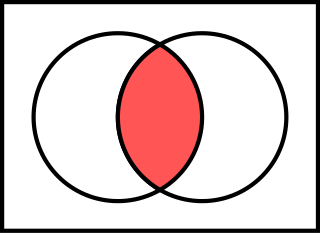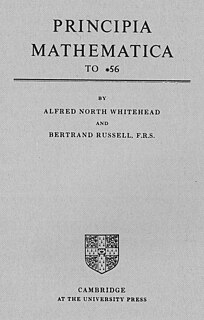Related Research Articles
First-order logic—also known as predicate logic, quantificational logic, and first-order predicate calculus—is a collection of formal systems used in mathematics, philosophy, linguistics, and computer science. First-order logic uses quantified variables over non-logical objects, and allows the use of sentences that contain variables, so that rather than propositions such as "Socrates is a man", one can have expressions in the form "there exists x such that x is Socrates and x is a man", where "there exists" is a quantifier, while x is a variable. This distinguishes it from propositional logic, which does not use quantifiers or relations; in this sense, propositional logic is the foundation of first-order logic.

In logic, mathematics and linguistics, And is the truth-functional operator of logical conjunction; the and of a set of operands is true if and only if all of its operands are true. The logical connective that represents this operator is typically written as or ⋅ .
Propositional calculus is a branch of logic. It is also called propositional logic, statement logic, sentential calculus, sentential logic, or sometimes zeroth-order logic. It deals with propositions and relations between propositions, including the construction of arguments based on them. Compound propositions are formed by connecting propositions by logical connectives. Propositions that contain no logical connectives are called atomic propositions.

The Principia Mathematica is a three-volume work on the foundations of mathematics written by the mathematicians Alfred North Whitehead and Bertrand Russell and published in 1910, 1912, and 1913. In 1925–1927, it appeared in a second edition with an important Introduction to the Second Edition, an Appendix A that replaced ✸9 and all-new Appendix B and Appendix C. PM is not to be confused with Russell's 1903 The Principles of Mathematics. PM was originally conceived as a sequel volume to Russell's 1903 Principles, but as PM states, this became an unworkable suggestion for practical and philosophical reasons: "The present work was originally intended by us to be comprised in a second volume of Principles of Mathematics... But as we advanced, it became increasingly evident that the subject is a very much larger one than we had supposed; moreover on many fundamental questions which had been left obscure and doubtful in the former work, we have now arrived at what we believe to be satisfactory solutions."
In logic and proof theory, natural deduction is a kind of proof calculus in which logical reasoning is expressed by inference rules closely related to the "natural" way of reasoning. This contrasts with Hilbert-style systems, which instead use axioms as much as possible to express the logical laws of deductive reasoning.
Deductive reasoning is the mental process of drawing deductive inferences. An inference is deductively valid if its conclusion follows logically from its premises, i.e. if it is impossible for the premises to be true and the conclusion to be false. For example, the inference from the premises "all men are mortal" and "Socrates is a man" to the conclusion "Socrates is mortal" is deductively valid. An argument is sound if it is valid and all its premises are true. Some theorists define deduction in terms of the intentions of the author: they have to intend for the premises to offer deductive support to the conclusion. With the help of this modification, it is possible to distinguish valid from invalid deductive reasoning: it is invalid if the author's belief about the deductive support is false, but even invalid deductive reasoning is a form of deductive reasoning.
In the philosophy of logic, a rule of inference, inference rule or transformation rule is a logical form consisting of a function which takes premises, analyzes their syntax, and returns a conclusion. For example, the rule of inference called modus ponens takes two premises, one in the form "If p then q" and another in the form "p", and returns the conclusion "q". The rule is valid with respect to the semantics of classical logic, in the sense that if the premises are true, then so is the conclusion.
In mathematical logic, a sequent is a very general kind of conditional assertion.
Understood in a narrow sense, philosophical logic is the area of philosophy that studies the application of logical methods to philosophical problems, often in the form of extended logical systems like modal logic. Some theorists conceive philosophical logic in a wider sense as the study of the scope and nature of logic in general. In this sense, philosophical logic can be seen as identical to the philosophy of logic, which includes additional topics like how to define logic or a discussion of the fundamental concepts of logic. The current article treats philosophical logic in the narrow sense, in which it forms one field of inquiry within the philosophy of logic.
Metalogic is the study of the metatheory of logic. Whereas logic studies how logical systems can be used to construct valid and sound arguments, metalogic studies the properties of logical systems. Logic concerns the truths that may be derived using a logical system; metalogic concerns the truths that may be derived about the languages and systems that are used to express truths.

In logic, syntax is anything having to do with formal languages or formal systems without regard to any interpretation or meaning given to them. Syntax is concerned with the rules used for constructing, or transforming the symbols and words of a language, as contrasted with the semantics of a language which is concerned with its meaning.
In traditional logic, contraposition is a form of immediate inference in which a proposition is inferred from another and where the former has for its subject the contradictory of the original logical proposition's predicate. In some cases, contraposition involves a change of the former's quality. For its symbolic expression in modern logic, see the rule of transposition. Contraposition also has philosophical application distinct from the other traditional inference processes of conversion and obversion where equivocation varies with different proposition types.
The laws of thought are fundamental axiomatic rules upon which rational discourse itself is often considered to be based. The formulation and clarification of such rules have a long tradition in the history of philosophy and logic. Generally they are taken as laws that guide and underlie everyone's thinking, thoughts, expressions, discussions, etc. However, such classical ideas are often questioned or rejected in more recent developments, such as intuitionistic logic, dialetheism and fuzzy logic.
In propositional logic, transposition is a valid rule of replacement that permits one to switch the antecedent with the consequent of a conditional statement in a logical proof if they are also both negated. It is the inference from the truth of "A implies B" to the truth of "Not-B implies not-A", and conversely. It is very closely related to the rule of inference modus tollens. It is the rule that
Substitution is a fundamental concept in logic. A substitution is a syntactic transformation on formal expressions. To apply a substitution to an expression means to consistently replace its variable, or placeholder, symbols by other expressions. The resulting expression is called a substitution instance, or instance for short, of the original expression.
Logic is the formal science of using reason and is considered a branch of both philosophy and mathematics and to a lesser extent computer science. Logic investigates and classifies the structure of statements and arguments, both through the study of formal systems of inference and the study of arguments in natural language. The scope of logic can therefore be very large, ranging from core topics such as the study of fallacies and paradoxes, to specialized analyses of reasoning such as probability, correct reasoning, and arguments involving causality. One of the aims of logic is to identify the correct and incorrect inferences. Logicians study the criteria for the evaluation of arguments.
In mathematical logic, a judgment or assertion is a statement or enunciation in the metalanguage. For example, typical judgments in first-order logic would be that a string is a well-formed formula, or that a proposition is true. Similarly, a judgment may assert the occurrence of a free variable in an expression of the object language, or the provability of a proposition. In general, a judgment may be any inductively definable assertion in the metatheory.
In mathematical logic, formation rules are rules for describing which strings of symbols formed from the alphabet of a formal language are syntactically valid within the language. These rules only address the location and manipulation of the strings of the language. It does not describe anything else about a language, such as its semantics. .
Philosophy of logic is the area of philosophy that studies the scope and nature of logic. It investigates the philosophical problems raised by logic, such as the presuppositions often implicitly at work in theories of logic and in their application. This involves questions about how logic is to be defined and how different logical systems relate to each other. It includes the study of the nature of the fundamental concepts used by logic and the relation of logic to other disciplines. According to a common characterization, philosophical logic is the part of the philosophy of logic that studies the application of logical methods to philosophical problems, often in the form of extended logical systems like modal logic. But other theorists draw the distinction between the philosophy of logic and philosophical logic differently or not at all. Metalogic is closely related to the philosophy of logic as the discipline investigating the properties of formal logical systems, like consistency and completeness.

Logic is the study of correct reasoning or good arguments. It is often defined in a more narrow sense as the science of deductively valid inferences or of logical truths. In this sense, it is equivalent to formal logic and constitutes a formal science investigating how conclusions follow from premises in a topic-neutral way or which propositions are true only in virtue of the logical vocabulary they contain. When used as a countable noun, the term "a logic" refers to a logical formal system. Formal logic contrasts with informal logic, which is also part of logic when understood in the widest sense. There is no general agreement on how the two are to be distinguished. One prominent approach associates their difference with the study of arguments expressed in formal or informal languages. Another characterizes informal logic as the study of ampliative inferences, in contrast to the deductive inferences studied by formal logic. But it is also common to link their difference to the distinction between formal and informal fallacies.
References
- ↑ Copi, Irving M.; Cohen, Carl (2005). Introduction to Logic. Prentice Hall.
- ↑ Hurley, Patrick (1991). A Concise Introduction to Logic 4th edition . Wadsworth Publishing.
- ↑ Moore and Parker [ full citation needed ]